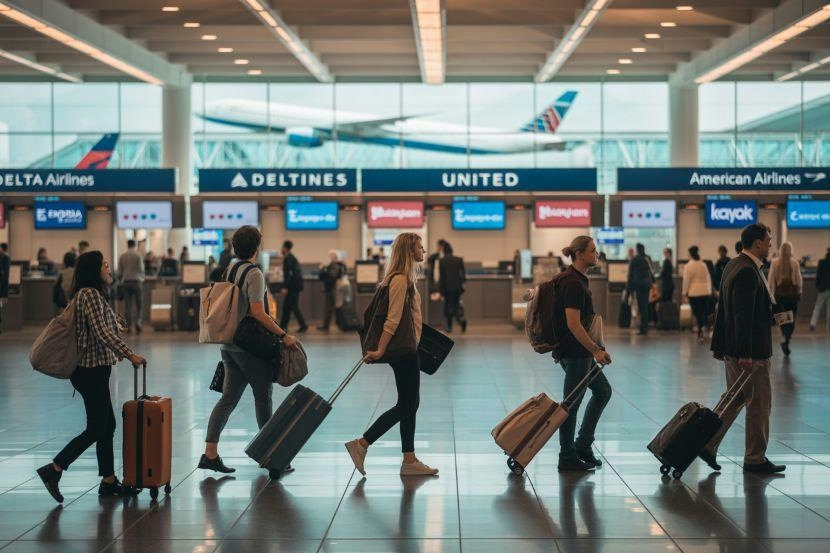AeroGenie — Seu Copiloto Inteligente.
Tendências
Categories
Online Travel Agencies Surpass Airlines in ChatGPT Travel Booking Searches

Online Travel Agencies Surpass Airlines in ChatGPT Travel Booking Searches
The rapid advancement of generative artificial intelligence is fundamentally altering the way travelers search for and book flights. Online Travel Agencies (OTAs) have emerged as the primary beneficiaries of this shift, capturing a substantially larger share of referral traffic from ChatGPT’s AI-powered search compared to traditional airline websites. This development marks a significant transformation in the digital travel ecosystem.
The Rise of OTAs in AI-Driven Travel Queries
Data from September 2025 reveals that ChatGPT accounted for 2.3% of referral traffic to airline websites, an increase from 1.8% in August and a notable rise since the launch of ChatGPT Search in November 2024. Despite this growth, OTAs and metasearch engines dominate the AI-driven referral landscape, receiving approximately 95% of traffic related to airline bookings. This trend underscores a fundamental change in consumer behavior, with travelers increasingly relying on aggregated platforms rather than direct airline sources.
ChatGPT’s flight-related responses predominantly favor OTAs and metasearch platforms such as Expedia and Kayak. A study conducted by PROS highlights that 74.6% of airline brand mentions within ChatGPT conversations do not include direct links, in stark contrast to just 8.8% for OTAs and 8.6% for metasearch sites. This discrepancy arises from the AI’s preference for platforms that provide comprehensive flight options and fare comparisons—capabilities that OTAs are uniquely positioned to offer.
Unlike airline websites, which often present static or fragmented information, OTAs aggregate data from multiple carriers, enabling side-by-side comparisons that align with AI’s need for rich, comparative content. This aggregation facilitates easier indexing and recommendation by AI engines, thereby increasing OTAs’ visibility and referral traffic.
Industry Implications and Market Dynamics
The ascendancy of OTAs in AI-driven travel searches signals a broader industry transformation. As AI platforms like ChatGPT become central to travel planning, traditional search engines are diminishing in relevance for these queries. This shift has already resulted in a 20% to 30% decline in visibility for many OTAs and metasearch sites that previously depended heavily on Google and similar search engines, as AI-generated summaries increasingly supplant conventional search results.
However, the rise of AI-powered booking tools also presents new challenges. OTAs face intensifying competition from emerging AI-driven direct booking solutions and may encounter resistance from traditional travel agencies striving to maintain their market share. To remain competitive, OTAs must continuously innovate and enhance user engagement, particularly as agentic AI technologies become more integrated into the booking process.
Consumers are gravitating toward more personalized and AI-enhanced booking experiences, prompting airlines and traditional agencies to adopt similar AI technologies or upgrade their platforms. This evolving landscape is likely to ignite a competitive marketing battle between major chatbots and OTAs, carrying significant financial implications for both sectors.
As AI continues to reshape travel search and booking, the balance of power within the industry is shifting rapidly, compelling all stakeholders to adapt or risk obsolescence.

Emirates Unveils Cabin Design for New Boeing 777X

Eighteen Years On, the Airbus A380 Remains Central to a $34 Billion Airline

How a boom in luxury airline seats is slowing down jet deliveries

Navitaire Outage Attributed to Planned Maintenance

DigiYatra Debuts Outside Aviation at India AI Impact Summit

Vietnam Orders Strengthen Boeing’s Commercial Outlook

Airbus Signals Uncertainty Over Future A400M Orders

JobsOhio Awards $2 Million Grant to Hartzell Propeller for Innovation Center

Collins Aerospace Tests Sidekick Autonomy Software on YFQ-42A for U.S. Air Force CCA Program

How the Airbus A350-1000 Compares to the Boeing 777
